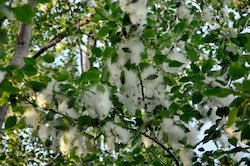Research from the University of Tennessee Center for Renewable Carbon has found that fast growing, short rotation wood crops (SRWC) are ideal as a biomass source to produce bionergy and biofuels. The research will be featured over the next three months as the Southeastern Partnership for Integrated Biomass Supply Systems’ (IBSS) Woody Crop Whistle Stop Tour that will feature Auburn University’s tractor-trailer scale mobile biomass gasifier. During the tour, the gasifier will demonstrate how to turn biomass into electricity on a small scale. Partners include North Carolina State University, ArborGen, University of Georgia, Auburn and UT.
On Tuesday, September 30, 2014 the tour will stop in Columbus, Miss., for an IBSS/Advanced Hardwood Biofuels (AHB) Field Day. Based on two years of successful experiments in the Southeast and Pacific Northwest with fast-growing cottonwood and hybrid poplars, IBSS, AHB, GreenWood Resources, and ArborGen have partnered to establish a 70-acre hybrid poplar plantation. Mississippi State University has also been an integral partner throughout the process, assisting in research and helping with field day activities. At this stop, visitors will get a close-up view of the SRWC system and learn about new research on genetics, stand establishment, disease problems, wildlife impacts and biomass harvesting logistics.
 On Friday, October 10, the tour will stop at the University of Tennessee Institute of Agriculture East Tennessee AgResearch and Education Center in Knoxville for a half-day Woody Crops Field Day. Visitors to the event will learn first-hand about new energy crops like fast-growing hybrid poplar and their importance as a feedstock for the emerging biofuels industry. This event will coincide with the IBSS Annual Meeting, so many experts will be on hand to answer questions about bioenergy production.
On Friday, October 10, the tour will stop at the University of Tennessee Institute of Agriculture East Tennessee AgResearch and Education Center in Knoxville for a half-day Woody Crops Field Day. Visitors to the event will learn first-hand about new energy crops like fast-growing hybrid poplar and their importance as a feedstock for the emerging biofuels industry. This event will coincide with the IBSS Annual Meeting, so many experts will be on hand to answer questions about bioenergy production.
Stops are also planned for September 13, 2014 at Auburn’s Ag Discovery Day and November 19 at the Alabama Joint Leadership Development Conference (JLDC). Details about each event can be found online at at the IBSS website.
The IBSS Partnership has also been involved in research to develop drop-in liquid fuels, such as gasoline, diesel and jet fuel for use as a replacement for grain (corn)-based ethanol. The project produced some 1500 gallons of a “green” diesel fuel from Southeastern-produced pine and poplar biomass and technology provided in part by industrial research partners.
Tim Rials, director of the UT Center for Renewable Carbon and a biochemist, contends that the U.S. should invest in the Southeast for the production of biofuels. “Our region can produce a variety of biomass feedstocks including dedicated crops such as switchgrass and sorghum, along with dedicated woody crops and forest residues,” he said.
The goal of the IBSS partnership is to demonstrate the production of advanced biofuels from sustainable sources of lignocellulosic biomass. Initially, the partnership has focused its efforts on perennial switchgrass and short-rotation woody crops like eucalyptus and poplar. Rials said each dedicated crop has inherent performance and cost advantages for specific conversion technologies. “We are working to match the economic and environmental performance of each feedstock with a preferred conversion platform so that the ultimate product, the particular biobased fuel, will be reliable, available and affordable.”

